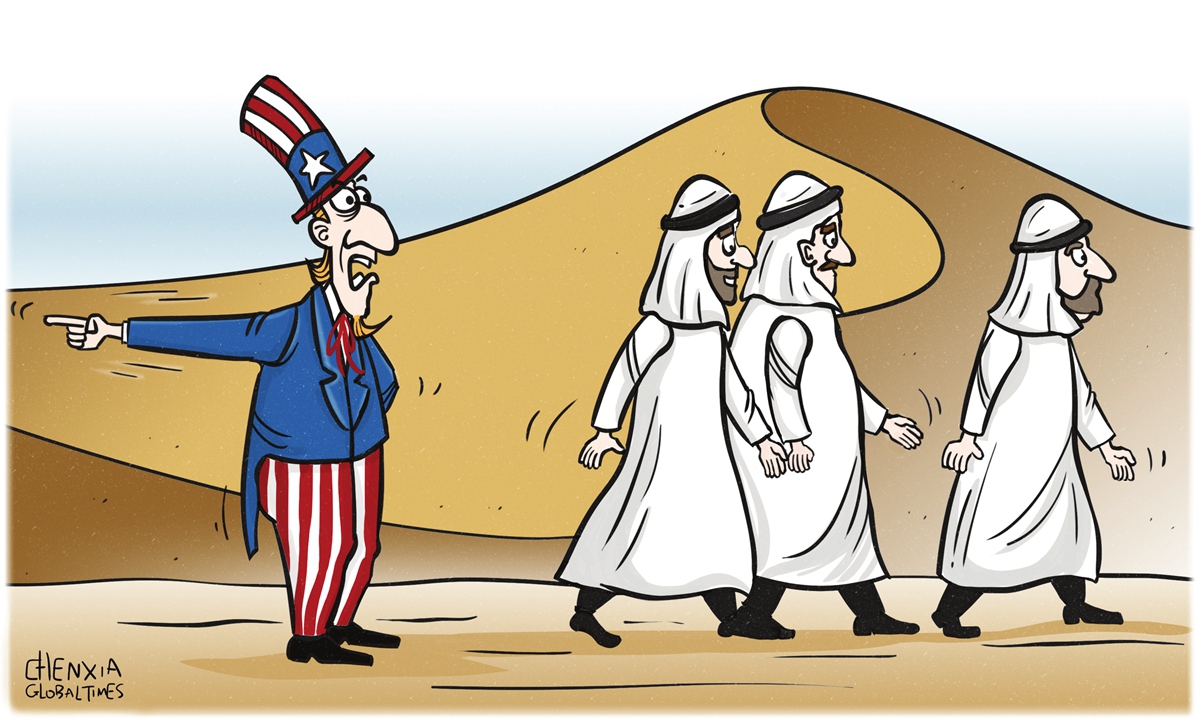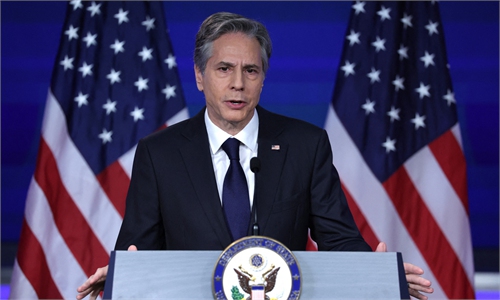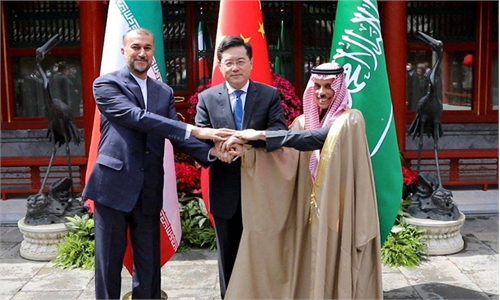
US Arab Illustration: Chen Xia/GT
The positive momentum of China-Saudi Arabia cooperation in terms of both economic and security aspects is giving Saudi Arabia more confidence to seek pragmatic cooperation with all sides, boycotting US efforts to woo it to take sides in geopolitical power games.During the 10th Arab-China Business Conference in Riyadh, Saudi Arabia's Energy Minister Prince Abdulaziz bin Salman said on Sunday that his country wants to collaborate, not compete, with China, Reuters reported.
When asked about Western skeptics being critical of the growing Saudi-China ties, the energy minister responded: "I actually ignore it because ... as a business person ... now you will go where opportunity comes your way."
Saudi Arabia's position that prioritizes economic cooperation, not political standards, is worth reference for those who are still fretting about walking a tightrope between China and the US. Indeed, it is not the first time for Saudi Arabian officials to express their reluctance to take sides between China and the US, despite the Biden administration's attempts to win it back.
Just last week, at a joint press conference in Riyadh with the visiting US Secretary of State Antony Blinken, Prince Faisal bin Farhan Al Saud, Saudi Arabia's Minister of Foreign Affairs, said "China is our largest trading partner, so naturally there is a lot of interaction and intersection with China ... That cooperation is likely to grow just because China's economic impact in the region and beyond is likely to grow as its economy continues to grow." He also made it clear that Saudi Arabia's relationships with Washington and Beijing won't "ascribe to a zero-sum game."
While Blinken mentioned that his country is not asking anyone to choose sides between China and the US, that's more because the US has seen its influence decline in the region, not because the US doesn't want Middle East countries to be sided with it. If anything, the coercion and temptation Washington has been using on its allies and other countries are evident enough to show that the Biden administration is actually pursuing its China containment strategy by making as many countries as possible to choose sides. For instance, the US-initiated chip war against China has already laid bare US politicians' "Cold War" mentality and paranoia about roping in allies on its chariot of "decoupling" from China.
But the zero-sum game of taking sides is now being resisted by a growing number of countries, especially developing ones like Saudi Arabia. This is because, for developing countries today, the most important thing is to develop their economies to improving the livelihood of their people, which can only be achieved through economic cooperation instead of being engaged in confronting some countries politically or "decoupling" from anyone. This is the general trend of international development, and no one can go against it.
The reason why China and Saudi Arabia are enjoying a "honeymoon" period of cooperation is that bilateral cooperation has addressed two major economic and security concerns of Saudi Arabia. First, China will remain the largest crude oil importer for the foreseeable future, while Saudi Arabia is a major oil exporter, therefore a constructive relationship with China is in line with the Middle East nation's interests. Second, the long-term security dilemma in the Middle East has gradually eased under China's mediation efforts, which has further freed up space for more China-Middle East cooperation.
China's development has now provided many opportunities for other countries, such as Saudi Arabia, to receive boosts to their economies, while Middle East countries now have the ability to choose their own partners based on their own development needs. With security concerns eased, they will be more sober and pragmatic to seek their own development path, which is also conducive to promoting regional peace.



